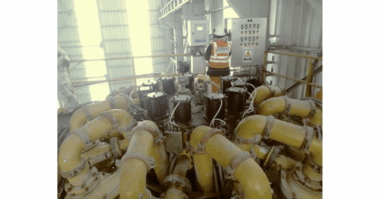RCM or Reliability Centered Maintenance has been viewed by many operations as too expensive or resource intensive for small and many medium size companies. But an understanding of the process and development of the RCM process over time will shed new light on the subject.
The RCM process ideology was developed by United Airlines and the department of defense. Issues with airline safety brought about the MRG study to look at failures of all aircraft components and develop ways to prevent or eliminate the failures. The study produced excellent results and information that change the way maintenance was looked at by the airline industry. To this day the process is used to develop the maintenance practices for every airliner built.
The military in all divisions also uses a process that is RCM based but now has a military reference and procedure model, but it all in all the RCM process. Other industries that adopted the process were nuclear plants, major petro chemical plants and other large high risk businesses. The RCM II process started this thought process and other RCM processes were developed around the basic principles. There was a standard developed which has the designation JA 1101 which many refer back to as the standard to follow. The truth is after looking at all the processes in use they all work and help develop good strategies for companies to follow.
No one entity or company owns the RCM process but many think they do. They just own the name of their particular process or database. So how does a small process or business understand which one to choose and how do they spend the time and money wisely? First they must understand the RCM fundamentals and what they are trying to accomplish in the end. The answer is the most effective way to determine how critical components fail and how we can predict, prevent, or eliminate these failures.
The fundamental of the RCM process is to select a piece of equipment or a process operation for the RCM technique. The selection may be a troublesome actor in the plant such as high downtime rate or quality issues. It may be a highly critical system that can create high downtime cost, environmental or safety issues that can put the company at risk. It is very important to use a process for selection so results can be effective in the end.
RCM fundamental steps:
Determine Functional Failures for the process:
- Failures that can create downtime
- Failures that can create reduced rate
- Failure that create product quality issues
- Failures that can create Environmental, Health, and Safety issues
- Failures that create Energy losses
The above functional failures can be isolated as individual or you can evaluate all of them for each process component.
Determine Failure Modes:
- From the list of components start determining how each component can or have failed.
After the predominate failure modes have been listed we want to ask (3) questions:
- Can the failure mode be predicted with a predictive technology? (PdM task)
Determine the best technology for the specific failure mode and be sure it will be effective.
- Can the failure mode be prevented with a preventive maintenance task? (PM Task)
Determine the PM tasks required for inspection/adjustment/lubrication/Etc. that will be effective. You may have current task that do not meet the definition of preventing the failure mode, Stop performing them!
- Can the failure mode be eliminated with a re-design? If failures are happening often enough to affect the above functional failures then a re-design may be considered. A redesign should eliminate the failure. Example: installing a larger bearing to eliminate reoccurring bearing failures. Example 2: installing an auto lube system with synthetic grease to eliminate short bearing life cycles due to heat or water.
Other RCM process terms that should be addressed:
- Failure Effect, understanding of what happens should the failure occur
- Probability of the Failure
- Consequence of the Failure
- Actions for personnel after the failure
Tasks
Tasks are the action plans/data developed to predict, prevent, or eliminate the failure modes.
- There can be multiple tasks for failure modes.
This is just a quick recap of the basic RCM process. There are economical solutions for small companies to perform the RCM process. It starts with some basic training and a small RCM example. Software and data bases are available to allow the smallest companies to enjoy the benefits of the RCM process. Don’t be intimidated by the big dollars expenditure of the big processes.
RCM is available for all. I have performed RCM analysis with one or two knowledgeable people in the room. I have a had great success at many small plants using the RCM principles. To be competitive it’s all about being a little better and more cost effective than your competitors. The less you are down the more product you produce. Units are dollars. Reducing quality issues and eliminating E,H,&S issues can keep you in business and avoid big dollar incidents.
For more information contact Charli or myself.



